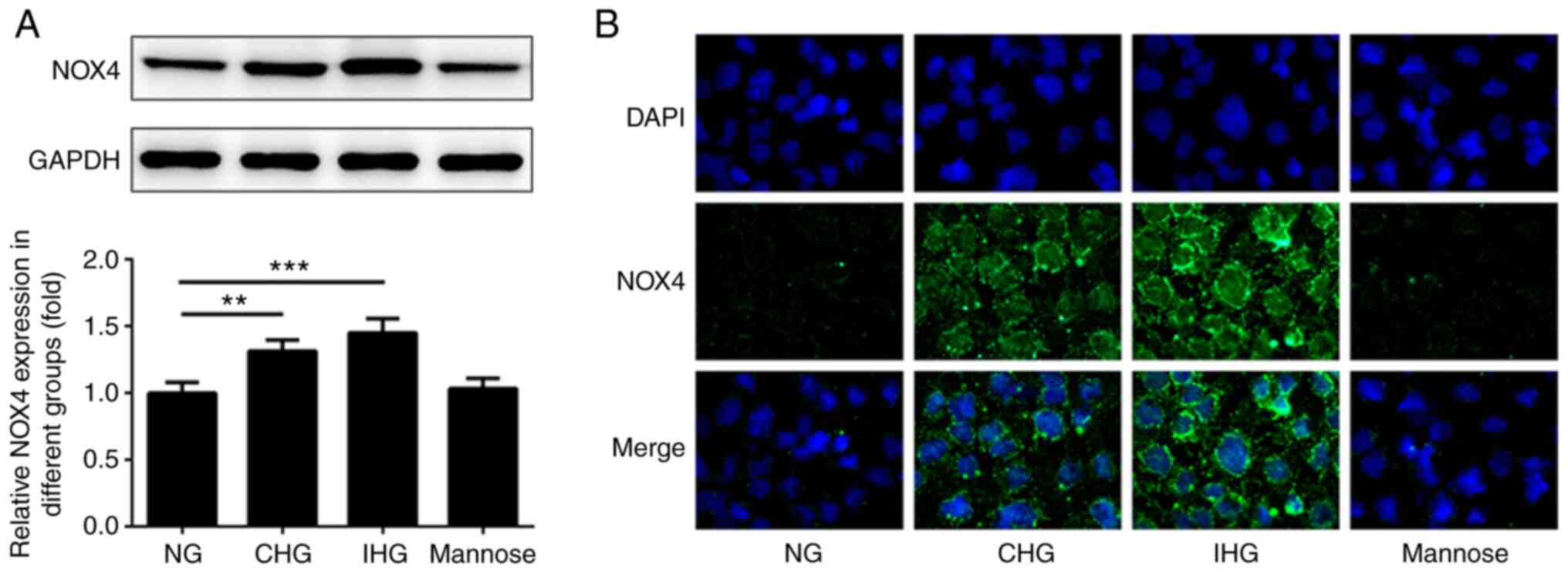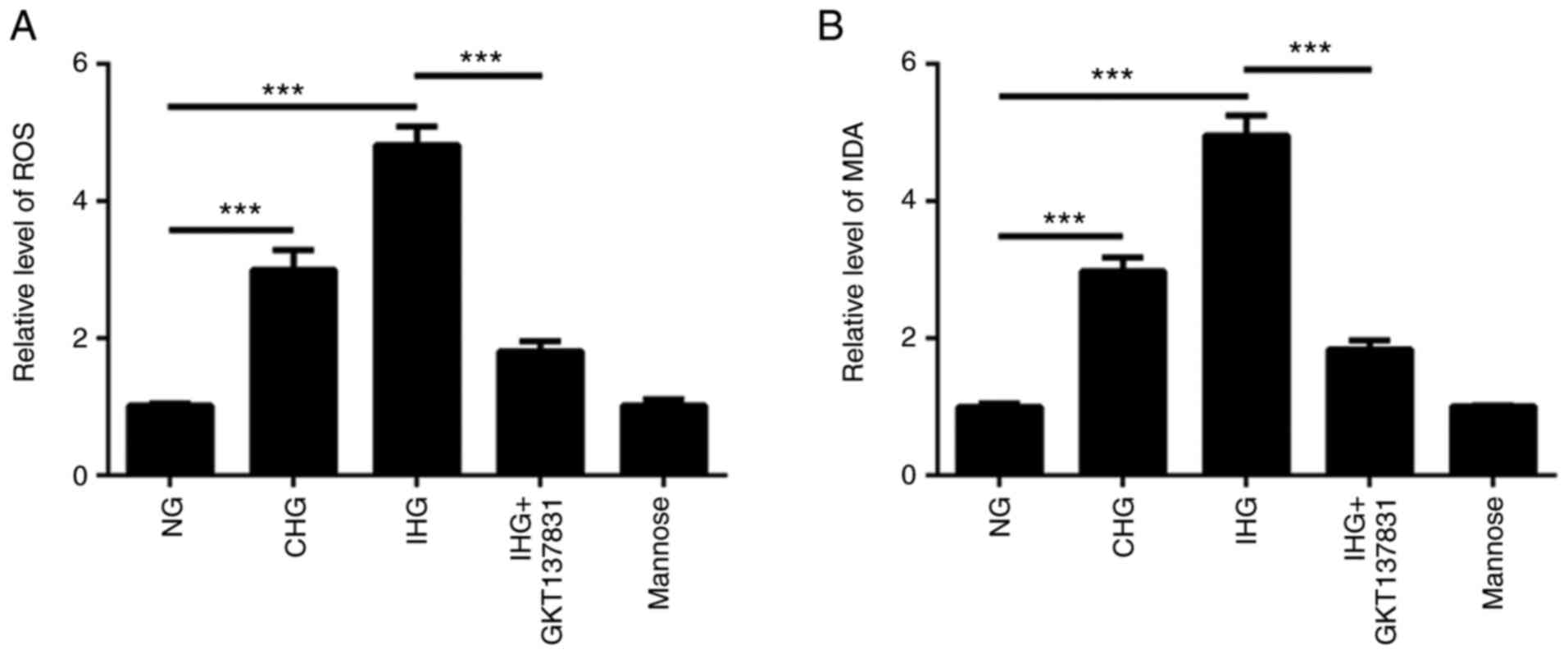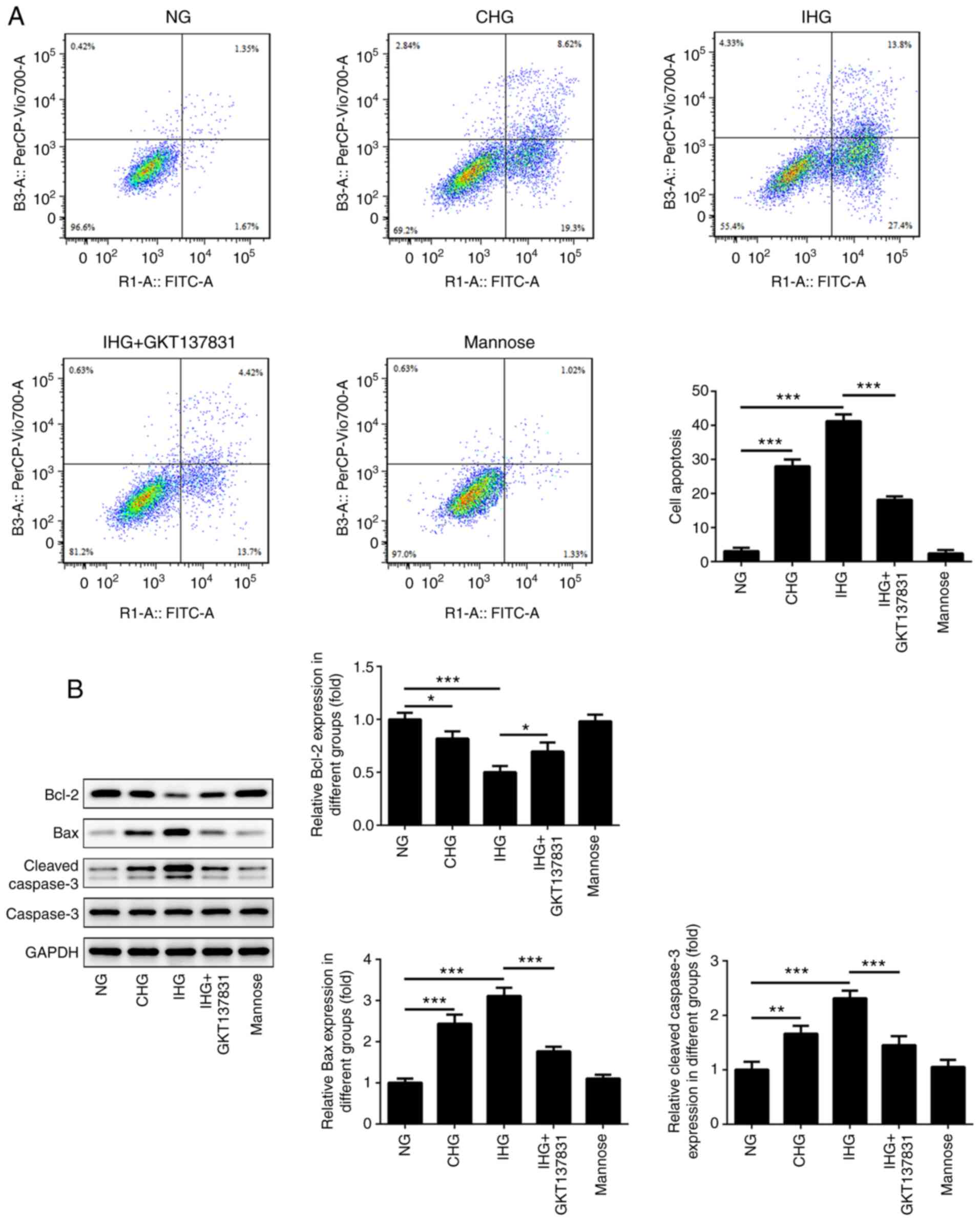|
1
|
Wilson PWF, D'Agostino RB, Helen P, Lisa S
and Meigs JB: Metabolic syndrome as a precursor of cardiovascular
disease and type 2 diabetes mellitus. Circulation. 112:3066–3072.
2005.PubMed/NCBI View Article : Google Scholar
|
|
2
|
Brownlee M: Biochemistry and molecular
cell biology of diabetic complications. Nature. 414:813–820.
2001.PubMed/NCBI View
Article : Google Scholar
|
|
3
|
Papatheodorou K, Banach M, Bekiari E,
Rizzo M and Edmonds M: Complications of diabetes 2017. J Diabetes
Res. 2018(3086167)2018.PubMed/NCBI View Article : Google Scholar
|
|
4
|
Snelson M, de Pasquale C, Ekinci EI and
Coughlan MT: Gut microbiome, prebiotics, intestinal permeability
and diabetes complications. Best Pract Res Clin Endocrinol Metab,
2021 (Ahead of print).
|
|
5
|
Talley NJ, Young L, Bytzer P, Hammer J,
Leemon M, Jones M and Horowitz M: Impact of chronic
gastrointestinal symptoms in diabetes mellitus on health-related
quality of life. Am J Gastroenterol. 96:71–76. 2001.PubMed/NCBI View Article : Google Scholar
|
|
6
|
Mooradian AD, Morley JE, Levine AS, Prigge
WF and Gebhard RL: Abnormal intestinal permeability to sugars in
diabetes mellitus. Diabetologia. 29:221–224. 1986.PubMed/NCBI View Article : Google Scholar
|
|
7
|
Meddings JB, Jarand J, Urbanski SJ, Hardin
J and Gall DG: Increased gastrointestinal permeability is an early
lesion in the spontaneously diabetic BB rat. Am J Physiol.
276:951–957. 1999.PubMed/NCBI View Article : Google Scholar
|
|
8
|
Neu J, Reverte CM, Mackey AD, Liboni K,
Tuhacek-Tenace LM, Hatch M, Li N, Caicedo RA, Schatz DA and
Atkinson M: Changes in intestinal morphology and permeability in
the biobreeding rat before the onset of type 1 diabetes. J Pediatr
Gastroenterol Nutr. 40:589–595. 2005.PubMed/NCBI View Article : Google Scholar
|
|
9
|
Chocarro-Calvo A, García-Martínez JM,
Ardila-González S, De la Vieja A and García-Jiménez C:
Glucose-induced β-catenin acetylation enhances Wnt signaling in
cancer. Mol Cell. 49:474–486. 2013.PubMed/NCBI View Article : Google Scholar
|
|
10
|
Baynes JW and Thorpe SR: Role of oxidative
stress in diabetic complications: A new perspective on an old
paradigm. Diabetes. 43:1–9. 1999.PubMed/NCBI View Article : Google Scholar
|
|
11
|
Babior BM: NADPH oxidase. Curr Opin
Immunol. 16:42–47. 2004.PubMed/NCBI View Article : Google Scholar
|
|
12
|
Ago T, Kuroda J, Kamouchi M, Sadoshima J
and Kitazono T: Pathophysiological roles of NADPH oxidase/nox
family proteins in the vascular system. Review and perspective.
Circ J. 75:1791–1800. 2011.PubMed/NCBI View Article : Google Scholar
|
|
13
|
Asaba K, Tojo A, Onozato ML, Goto A, Quinn
MT, Fujita T and Wilcox CS: Effects of NADPH oxidase inhibitor in
diabetic nephropathy. Kidney Int. 67:1890–1898. 2005.PubMed/NCBI View Article : Google Scholar
|
|
14
|
Roe ND, Thomas DP and Ren J: Inhibition of
NADPH oxidase alleviates experimental diabetes-induced myocardial
contractile dysfunction. Diabetes Obes Metab. 13:465–473.
2011.PubMed/NCBI View Article : Google Scholar
|
|
15
|
Teixeira G, Szyndralewiez C, Molango S,
Carnesecchi S, Heitz F, Wiesel P and Wood JM: Therapeutic potential
of NADPH oxidase 1/4 inhibitors. Br J Pharmacol. 174:1667–1669.
2017.PubMed/NCBI View Article : Google Scholar
|
|
16
|
Wang JW, Pan YB, Cao YQ, Wang C, Jiang WD,
Zhai WF and Lu JG: Loganin alleviates LPS-activated intestinal
epithelial inflammation by regulating TLR4/NF-κB and JAK/STAT3
signaling pathways. Kaohsiung J Med Sci. 36:257–264.
2020.PubMed/NCBI View Article : Google Scholar
|
|
17
|
Hirano T, Ishihara KM and Hibi M: Roles of
STAT3 in mediating the cell growth, differentiation and survival
signals relayed through the IL-6 family of cytokine receptors.
Oncogene. 19:2548–2556. 2000.PubMed/NCBI View Article : Google Scholar
|
|
18
|
Monnier L, Mas E, Ginet C, Michel F,
Villon L, Cristol JP and Colette C: Activation of oxidative stress
by acute glucose fluctuations compared with sustained chronic
hyperglycemia in patients with type 2 diabetes. JAMA.
295:1681–1687. 2006.PubMed/NCBI View Article : Google Scholar
|
|
19
|
Ceriello A, Esposit K, Piconi L, Ihnat MA,
Thorpe JE, Testa R, Boemi M and Giugliano D: Oscillating glucose is
more deleterious to endothelial function and oxidative stress than
mean glucose in normal and type 2 diabetic patients. Diabetes.
57:1349–1354. 2008.PubMed/NCBI View Article : Google Scholar
|
|
20
|
Lee MK, Kim IH, Choi YH and Nam TJ: A
peptide from Porphyra yezoensisstimulates the proliferation of
IEC-6 cells by activating the insulin-like growth factor I receptor
signaling pathway. Int J Mol Med. 35:533–538. 2015.PubMed/NCBI View Article : Google Scholar
|
|
21
|
Shen JT, Li YS, Xia ZQ, Wen SH, Yao X,
Yang WJ, Li C and Liu KX: Remifentanil preconditioning protects the
small intestine against ischemia/reperfusion injury via intestinal
δ- and µ-opioid receptors. Surgery. 159:548–559. 2016.PubMed/NCBI View Article : Google Scholar
|
|
22
|
Ying C, Wang S, Lu Y, Chen L, Mao Y, Ling
H, Cheng X and Zhou X: Glucose fluctuation increased mesangial cell
apoptosis related to AKT signal pathway. Arch Med Sci. 15:730–737.
2019.PubMed/NCBI View Article : Google Scholar
|
|
23
|
Hsieh CF, Liu CK, Lee CT, Yu LE and Wang
JY: Acute glucose fluctuation impacts microglial activity, leading
to inflammatory activation or self-degradation. Sci Rep.
9(840)2019.PubMed/NCBI View Article : Google Scholar
|
|
24
|
Quagliaro L, Piconi L, Assaloni R,
Martinelli L, Motz E and Ceriello A: Intermittent high glucose
enhances apoptosis related to oxidative stress in human umbilical
vein endothelial cells: The Role of Protein Kinase C and
NAD(P)H-Oxidase Activation. Diabetes. 52:2795–2804. 2003.PubMed/NCBI View Article : Google Scholar
|
|
25
|
Cho JH, Chang SA, Kwon HS, Choi YH, Ko SH,
Moon SD, Yoo SJ, Song KH, Son HS, Kim HS, et al: Long-term effect
of the Internet-based glucose monitoring system on HbA1c reduction
and glucose stability: A 30-month follow-up study for diabetes
management with a ubiquitous medical care system. Diabetes Care.
29:2625–2631. 2006.PubMed/NCBI View Article : Google Scholar
|
|
26
|
Liu Q, Huang QX, Lou FC, Zhang L and Hou
WK, Yu S, Xu H, Wang Q, Zhang Y and Hou WK: Effects of glucose and
insulin on the H9c2 (2-1) cell proliferation may be mediated
through regulating glucose transporter 4 expression. Chin Med J
(Engl). 126:4037–4042. 2013.PubMed/NCBI
|
|
27
|
Lopez R, Arumugam A, Joseph R, Monga K,
Boopalan T, Agullo P, Gutierrez C, Nandy S, Subramani R, de la Rosa
JM and Lakshmanaswamy R: Hyperglycemia enhances the proliferation
of non-tumorigenic and malignant Mammary epithelial cells through
increased leptin/IGF1R signaling and activation of AKT/mTOR. PLoS
One. 8(e79708)2013.PubMed/NCBI View Article : Google Scholar
|
|
28
|
Ozmen A, Unek G, Kipmen-Korgun D and
Korgun ET: The PI3K/Akt and MAPK-ERK1/2 pathways are altered in STZ
induced diabetic rat placentas. Histol Histopathol. 29:743–756.
2013.PubMed/NCBI View Article : Google Scholar
|
|
29
|
Adachi T, Mori C, Sakurai K, Shihara N,
Tsuda K and Yasuda K: Morphological changes and increased sucrase
and isomaltase activity in small intestines of insulin-deficient
and type 2 diabetic rats. Endocr J. 50:271–279. 2003.PubMed/NCBI View Article : Google Scholar
|
|
30
|
Rasool S, Kadla SA, Rasool V and Ganai BA:
A comparative overview of general risk factors associated with the
incidence of colorectal cancer. Tumor Biology. 34:2469–2476.
2013.PubMed/NCBI View Article : Google Scholar
|
|
31
|
Hata K, Kubota M, Shimizu M, Moriwaki H,
Kuno T, Tanaka T, Hara A and Hirose Y: Monosodium glutamate-induced
diabetic mice are susceptible to azoxymethane-induced colon
tumorigenesis. Carcinogenesis. 33:702–707. 2012.PubMed/NCBI View Article : Google Scholar
|
|
32
|
King GL and Loeken MR:
Hyperglycemia-induced oxidative stress in diabetic complications.
Histochem Cell Biol. 122:333–338. 2004.PubMed/NCBI View Article : Google Scholar
|
|
33
|
Wu N, Shen H, Liu H, Wang Y, Bai Y and Han
P: Acute blood glucose fluctuation enhances rat aorta endothelial
cell apoptosis, oxidative stress and pro-inflammatory cytokine
expression in vivo. Cardiovasc Diabetol. 15(109)2016.PubMed/NCBI View Article : Google Scholar
|
|
34
|
Sharma A, Tate M, Mathew G, Vince JE,
Ritchie RH and Haan JB: Oxidative stress and NLRP3-inflammasome
activity as significant drivers of diabetic cardiovascular
complications: Therapeutic implications. Front Physiol.
9(114)2018.PubMed/NCBI View Article : Google Scholar
|
|
35
|
Lal MA, Brismar H, Eklöf AC and Aperia A:
Role of oxidative stress in advanced glycation end product-induced
mesangial cell activation. Kidney Int. 61:2006–2014.
2002.PubMed/NCBI View Article : Google Scholar
|
|
36
|
Zhang W, Zhao S, Li Y, Peng G and Han P:
Acute blood glucose fluctuation induces myocardial apoptosis
through oxidative stress and nuclear factor-ĸB activation.
Cardiology. 124:11–17. 2013.PubMed/NCBI View Article : Google Scholar
|
|
37
|
Xue B, Wang L, Zhang Z, Wang R, Xia XX,
Han PP, Cao LJ, Liu YH and Sun LQ: Puerarin may protect against
Schwann cell damage induced by glucose fluctuation. J Nat Med.
71:472–481. 2017.PubMed/NCBI View Article : Google Scholar
|
|
38
|
Xia J, Hu S, Xu J, Hao H, Yin C and Xu D:
The correlation between glucose fluctuation from self-monitored
blood glucose and the major adverse cardiac events in diabetic
patients with acute coronary syndrome during a 6-month follow-up by
WeChat application. Clin Chem Lab Med. 56:2119–2124.
2018.PubMed/NCBI View Article : Google Scholar
|
|
39
|
Glucose tolerance and mortality.
Comparison of WHO and American Diabetes Association diagnostic
criteria. The DECODE study group. European Diabetes Epidemiology
Group. Diabetes Epidemiology: Collaborative analysis Of Diagnostic
criteria in Europe. Lancet. 354:617–621. 1999.PubMed/NCBI
|
|
40
|
Curtin JF, Donovan M and Cotter TG:
Regulation and measurement of oxidative stress in apoptosis. J
Immunol Methods. 265:49–72. 2002.PubMed/NCBI View Article : Google Scholar
|
|
41
|
Nikoletopoulou V, Markaki M, Palikaras K
and Tavernarakis N: Crosstalk between apoptosis, necrosis and
autophagy. Biochim Biophys Acta. 1833:3448–3459. 2013.PubMed/NCBI View Article : Google Scholar
|
|
42
|
Hussain T, Tan B, Yin Y, Blachier F,
Tossou MC and Rahu N: Oxidative stress and inflammation: What
Polyphenols Can Do for Us? Oxid Med Cell Longev.
2016(7432797)2016.PubMed/NCBI View Article : Google Scholar
|
|
43
|
Shen Y, Zhang Q, Huang Z, Zhu J, Qiu J, Ma
W, Yang X, Ding F and Sun H: Isoquercitrin delays denervated soleus
muscle atrophy by inhibiting oxidative stress and inflammation.
Front Physiol. 11(988)2020.PubMed/NCBI View Article : Google Scholar
|
|
44
|
Meng XM, Ren GL, Gao L, Yang Q, Li HD, Wu
WF, Huang C, Zhang L, Lv XW and Li J: NADPH oxidase 4 promotes
cisplatin-induced acute kidney injury via ROS-mediated programmed
cell death and inflammation. Lab Invest. 98:63–78. 2018.PubMed/NCBI View Article : Google Scholar
|
|
45
|
Sedeek M, Montezano AC, Hebert RL, Gray
SP, Di Marco E, Jha JC, Cooper ME, Jandeleit-Dahm K, Schiffrin EL,
Wilkinson-Berka JL and Touyz RM: Oxidative stress, Nox isoforms and
complications of diabetes-potential targets for novel therapies. J
Cardiovasc Transl Res. 5:509–518. 2012.PubMed/NCBI View Article : Google Scholar
|
|
46
|
Sedeek M, Nasrallah R, Touyz RM and Hebert
RL: NADPH oxidases, reactive oxygen species, and the kidney: Friend
and foe. J Am Soc Nephrol. 24:1512–1518. 2013.PubMed/NCBI View Article : Google Scholar
|
|
47
|
Chu FF, Esworthy RS, Shen B, Gao Q and
Doroshow JH: Dexamethasone and Tofacitinib suppress NADPH oxidase
expression and alleviate very-early-onset ileocolitis in mice
deficient in GSH peroxidase 1 and 2. Life Sci.
239(116884)2019.PubMed/NCBI View Article : Google Scholar
|
|
48
|
Lindquist RL, Bayat-Sarmadi J, Leben R,
Niesner R and Hauser AE: NAD(P)H oxidase activity in the small
intestine is predominantly found in enterocytes, not professional
phagocytes. Int J Mol Sci. 19(1365)2018.PubMed/NCBI View Article : Google Scholar
|
|
49
|
Yan J, Wang C, Jin Y, Meng Q, Liu Q, Liu
Z, Liu K and Sun H: Catalpol ameliorates hepatic insulin resistance
in type 2 diabetes through acting on AMPK/NOX4/PI3K/AKT pathway.
Pharmacol Res. 130:466–480. 2018.PubMed/NCBI View Article : Google Scholar
|
|
50
|
Sun L, Li W, Li W, Xiong L, Li G and Ma R:
Astragaloside IV prevents damage to human mesangial cells through
the inhibition of the NADPH oxidase/ROS/Akt/NF-κB pathway under
high glucose conditions. Int J Mol Med. 34:167–176. 2014.PubMed/NCBI View Article : Google Scholar
|
|
51
|
Chen F, Qian LH, Deng B, Liu ZM, Zhao Y
and Le YY: Resveratrol protects vascular endothelial cells from
high glucose-induced apoptosis through inhibition of NADPH oxidase
activation-driven oxidative stress. CNS Neurosci Ther. 19:675–681.
2013.PubMed/NCBI View Article : Google Scholar
|
|
52
|
Chowdhury SR, Saleh A, Akude E, Smith DR,
Morrow D, Tessler L, Calcutt NA and Fernyhough P: Ciliary
neurotrophic factor reverses aberrant mitochondrial bioenergetics
through the JAK/STAT pathway in cultured sensory neurons derived
from streptozotocin-induced diabetic rodents. Cell Mol Neurobiol.
34:643–649. 2014.PubMed/NCBI View Article : Google Scholar
|
|
53
|
Li Q, Lin Y, Wang S, Zhang L and Guo L:
GLP-1 inhibits high-glucose-induced oxidative injury of vascular
endothelial cells. Sci Rep. 7(8008)2017.PubMed/NCBI View Article : Google Scholar
|
|
54
|
Liu M, Yan L, Liang B, Li Z, Jiang Z, Chu
C and Yang J: Hydrogen sulfide attenuates myocardial fibrosis in
diabetic rats through the JAK/STAT signaling pathway. Int J Mol
Med. 41:1867–1876. 2018.PubMed/NCBI View Article : Google Scholar
|
|
55
|
Marrero MB, Banes-Berceli AK, Stern DM and
Eaton DC: Role of the JAK/STAT signaling pathway in diabetic
nephropathy. Am J Physiol Renal Physiol. 290:F762–F768.
2006.PubMed/NCBI View Article : Google Scholar
|
|
56
|
Wang X, Shaw S, Amiri F, Eaton DC and
Marrero MB: Inhibition of the Jak/STAT signaling pathway prevents
the high glucose-induced increase in tgf-beta and fibronectin
synthesis in mesangial cells. Diabetes. 51:3505–3509.
2002.PubMed/NCBI View Article : Google Scholar
|
|
57
|
Yoshikawa H, Matsubara K, Qian GS, Jackson
P, Groopman JD, Manning JE, Harris CC and Herman JG: SOCS-1, a
negative regulator of the JAK/STAT pathway, is silenced by
methylation in human hepatocellular carcinoma and shows
growth-suppression activity. Nat Genet. 28:29–35. 2001.PubMed/NCBI View Article : Google Scholar
|
|
58
|
Das A, Salloum FN, Durrant D, Ockaili R
and Kukreja RC: Rapamycin protects against myocardial
ischemia-reperfusion injury through JAK2-STAT3 signaling pathway. J
Mol Cell Cardiol. 53:858–869. 2012.PubMed/NCBI View Article : Google Scholar
|
|
59
|
Sun X, Chen RC, Yang ZH, Sun GB, Wang M,
Ma XJ, Yang LJ and Sun XB: Taxifolin prevents diabetic
cardiomyopathy in vivo and in vitro by inhibition of oxidative
stress and cell apoptosis. Food Chem Toxicol. 63:221–232.
2014.PubMed/NCBI View Article : Google Scholar
|



















